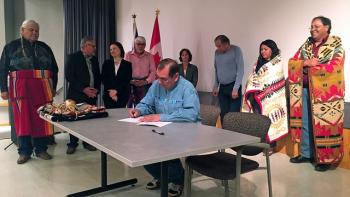Image Caption
By Shari Narine
Windspeaker Contributor
FORT McMURRAY, Alta.
A year after the legislation passed, the Indigenous Wisdom Advisory Panel is ready to begin the work of informing environmental monitoring decisions.
“A key point is not only the active participation (in monitoring) but the inclusion of our Indigenous knowledge,” said Melody Lepine, one of seven members on the panel.
Lepine, who is a member of the Mikisew Cree Nation and a director for industry relations with the First Nation, said it is Indigenous communities that are directly and adversely impacted by rapid and widespread oilsands development and it is Indigenous people who are first to experience the effects, so “our participation and Indigenous knowledge in environmental monitoring seems like a natural things to do.”
But that has not been happening. Until now.
Environment and Parks Minister Shannon Phillips said the legislation that created the wisdom panel last spring is the first of its kind in Canada and is a solid indication that the province is committed to doing things differently.
“Historically, we had an exclusion of voices and knowledge of Indigenous peoples who often are the most affected by industrial development of various kinds. The Indigenous Wisdom Advisory Panel was necessary to ensure that our environmental science reflects contextual knowledge, tradition, and methods of Indigenous peoples,” she said. She also noted that it furthered the province’s commitment to the United Nations Declaration on the Rights of Indigenous Peoples.
The Wisdom Panel and the Science Advisory Panel, governed by the same legislation, will be working together.
“As we move forward we are eager to braid your natural knowledge with our science… to benefit from your traditional wisdom and to generate what you know about lands and waters and tie it to the science we have together,” said Jill Baron, chair of the Science Panel.
Both panels will present advice to both Phillips and Fred Wrona, chief scientist of Alberta Environments and Parks.
“We are looking to be integrated collectively working for a common vision of getting better information available to our programs in terms of informing new policies and directions we need to head,” said Wrona.
Indigenous Wisdom Advisory Panel signed its mandate in Fort McMurray May 31, in the heart of oilsands development. The mandate includes several unique features, including a consensus-based process for giving collective advice and a recognition of the importance of both oral and written communication. The Wisdom Panel will follow the principles of good faith; sharing; mutual respect and honour; kindness; generosity; trust; and humility; as they have established.
Those principles, said Phillips, “really ground us on how we should be approaching all of our decision-making.”
Rounding out the IWAP members are Elder Leroy Little Bear, senior advisor to the president of the University of Lethbridge; Elder Elmer Ghostkeeper, council member with Buffalo Lake Metis Settlement; Elder Henry Lickers, environmental science officer with Mohawk Council of Akwesasne; Harley Bastien, president of Harmony Walker Inc.; and Elder Reg Crowshoe, professor of Indigenous Studies at the Univeristy of Calgary.
Twice a year, IWAP will meet with the chief scientist to discuss how to improve approaches to applying Indigenous wisdom in environmental monitoring. The Science Advisory Panel will assess the scientific quality of environmental monitoring.

